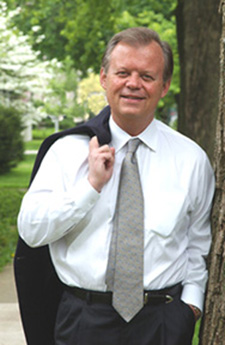
RPCV Tony Hall says Sudan's crisis is American issue
Sudan's crisis is American issue
U.S. needs to live ideals, protect interests
By Tony Hall
for the Dayton Daily News
I still remember the vultures flying overhead, waiting to pick over the dead in the burned-out village. Armed militias had swept in on horseback, slaughtering the men and boys, raping the women and girls. Sadly, these scenes are being repeated all over again.
Half a dozen years ago, I visited the war-torn regions in southern Sudan. Now the violence simply has shifted, like the sands in the Sahara Desert.
Today in the Darfur region of western Sudan, people are suffering and dying on a massive scale. United Nations officials and others have called the suffering "the worst humanitarian situation in the world today."
It's estimated that between one million and two million people have been forced from their homes and now live as widows, orphans, sex slaves and refugees. They have not been able to harvest crops, plant seeds or tend their fields and are now dependent on outside assistance to survive. Hundreds of thousands will die.
My close friend, U.S. Rep. Frank Wolf of Virginia, Secretary of State Colin Powell and U.N. Secretary General Kofi Annan have visited recently to investigate the human rights abuses and humanitarian emergency in Darfur, a region the size of Texas. I also hope to visit the area soon.
Some of you might be saying: "There goes the Tony Hall broken record again — people are dying in a far corner of our planet and we should jump in and save them. What about the people struggling to make ends meet here?"
Three answers come to mind, and I won't even invoke our moral and ethical responsibilities.
First, we should be concerned about a return on our investment. The United States has spent time, energy and resources to negotiate a peace settlement in Sudan. President George W. Bush, Secretary Powell and our new U.S. ambassador to the U.N., John Danforth, all have been involved in ending the civil war in southern Sudan. Sudan has seen conflict since its independence, and the war — which began when President Ronald Reagan was in his first term — has claimed more than two million lives.
Sudan's government recently signed a historic peace agreement with the rebels in the south, in no small part because of our efforts. The government is about to snatch defeat from the jaws of victory. If the ethnic and religious battles that blazed in the south are allowed to continue in the west, we lose almost all that we have worked to achieve. There will be no peace for Sudan, or the region, until the crisis in Darfur is resolved.
Second, Sudan is a front in our war on terrorism. Before al-Qaida leaders were sheltered by the Taliban in Afghanistan, they operated training camps in Sudan. If a huge part of the country were to become an ungovernable wasteland, that would be an invitation for them to come back. As we know from nearby Somalia, a "failed state" does not serve the interests of our national security — or regional or global security.
In our efforts to prevent terrorists from having access to financing or diplomatic support, we also must ensure that the places where they can locate keep shrinking. More than just limiting the physical space available to them, we must confront the hatred and violence that create the deadly cocktail of terrorism.
The Arab militias, the Janjaweed, are poisoning wells and wombs, with their pillaging of Darfur villages and raping of women. But they are also poisoning minds — both their own and those of their victims. In our efforts to stamp out terrorism, we cannot allow the conditions that spawn even more.
Third, we need to honor American ideals. We believe in the value of life, liberty and the pursuit of happiness; not just for ourselves, but as ideals for everyone. These do not exist if you are pursued by marauders who already have stolen your liberty and want to take your life.
In a fight between Arab Muslims and African Muslims, we are standing up for those who are defenseless. We have been unwavering in our demands on the Sudanese government and generous in our humanitarian response. The United States has committed more than $300 million to this crisis, including 70 percent of the food aid given so far to feed 1.5 million people. So far, our European allies have only given one-third as much.
People in Rotary Clubs around the country (and around the world) should be particularly concerned about this situation. For years, they have raised money to eliminate polio. They, and everyone else involved in the fight, were only a few countries away from putting polio in the history books. But now it is back again, with cases reported in Darfur and around the region.
The re-emergence of polio in the region is a serious threat to the global eradication effort. Polio can still be stopped, but only if the world acts quickly to support the emergency immunization campaign. If we don't, then we risk having to start all over again.
We cannot deliver independence for everyone in the world who isn't free, but we can continue to stand up for what is right. We can continue to care, and we can continue to be a beacon of hope to the world — even in places like Sudan.
Tony P. Hall, who represented the Dayton area in the U.S. House of Representatives for 24 years, is the U.S. ambassador to the United Nations' food and agriculture organizations.

